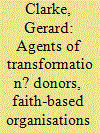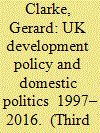| Srl | Item |
| 1 |
ID:
078948


|
|
|
|
|
| Publication |
2007.
|
| Summary/Abstract |
Recent donor discourse points to the potential of faith-based organisations (fbos) as 'agents of transformation', mobilising the moral energy of faith communities in support of the Millennium Developments Goals (mdgs). This new donor-driven agenda, however, invites scrutiny of complementary processes of organisational change within donor institutions. This article therefore examines donor policy and practice concerned with engagement with fbos. While considering the work of a number of donors, it focuses on the UK Department for International Development (dfid) and traces the reasons for dfid's growing interest in fbos from 1997. It examines the challenges which dfid faces in further developing this engagement and considers whether it and others donors can themselves become 'agents of transformation', embracing a less material and less secular vision of well-being and a more culturally inclusive approach to partnership. In contrast to recent scholarship, which presents a benign view of the emerging 'faith and development' interface, this article considers it as a controversial new Zeitgeist in development policy and discourse.
|
|
|
|
|
|
|
|
|
|
|
|
|
|
|
|
| 2 |
ID:
157707


|
|
|
|
|
| Summary/Abstract |
Debate surrounds the relative importance of development aid and development policy in donor efforts to support international development. Likewise, the literature on UK development policy points to its putative stability and consistency over time. Both perspectives, however, underplay the political contention which characterises UK development policy and its variable effects. This article, therefore, examines UK development policy between 1997 and 2016 and the varying extent to which it gave rise to contentious politics over time. It explores three politically-significant periods in the context of UK development policy between 1997 and 2016: the first between 1997 and 2003, characterised, I argue, by political consensus and managed contention; a second between 2003 and 2010, characterised by transition and emerging political contention; and a third, between 2010 and 2016, characterised by contentious politics and political fracturing. I associate the first period with effective political vision and direction and the third with a significant erosion of both, to the detriment of UK development policy and its efficacy. In conclusion, I argue that UK development policy has been most effective when it has been underpinned by a clear and consensual political vision.
|
|
|
|
|
|
|
|
|
|
|
|
|
|
|
|